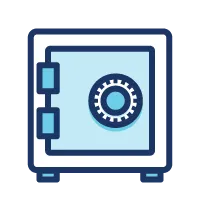Key Takeaways
- Taking out loans, becoming an authorized user, and repaying existing loans can help you build credit without having a credit card.
- No matter what strategy you choose to build credit, making payments on time is key to building a good credit score.
- While not all bills impact your credit, consistent and timely payments for items like student loans and cell phone bills can positively contribute to building a strong credit profile.
The idea of building credit without a credit card may seem challenging, but it's certainly possible. Here we’ll explore different ways to establish credit, why you might consider building credit without a credit card, and how to build credit from scratch.
Why Build Credit Without a Credit Card?
First, why might you want to build credit without a credit card? You may prefer to avoid credit cards if you’re concerned about overspending or don't trust your ability to manage credit. Perhaps you don’t qualify for a traditional credit card due to a limited credit history or other financial constraints. Building credit without a credit card provides an alternative path to financial credibility and stability.
While these factors can be true for any adult, it’s especially common for young adults who just turned 18 to want to build credit without a credit card. New adults typically have limited credit history and need a safe way to build their credit score. Learning to build credit without a credit score can help young adults get started on their financial paths.
5 Ways to Build Credit Without a Credit Card
- Become an authorized user
- Apply for a personal loan
- Apply for an auto loan
- Repay an existing loan
- Report alternate payments
These strategies will help you build credit without a credit card.
1. Become an Authorized User
One financial hack many people use to establish credit is to become an authorized user on someone else’s account. The key to having success with this strategy is to only become an authorized user with someone who is and has been extremely responsible with credit cards .
When the authorized user is added to the primary account, the authorized user will benefit from the primary account holder’s longer record of on-time payments and lower credit utilization.
For example, you may currently have a $1,000 credit limit with a $300 balance, thus having a credit utilization of 30%.
However, when you become an authorized user on another account with a credit limit of $30,000 and a balance of $1,000, your overall credit utilization decreases to about 4%.
Best Practices for Being an Authorized User
When becoming an authorized user, one of the better practices is to have your name added onto the primary account but then never actually taking ownership of the additional credit card.
This protects the primary account holder if you were to overspend using the credit card while still giving you the same benefits of helping you build credit if you were to have the card in your possession.
Also, make certain that the primary account holder’s financial institution reports authorized users to the three credit reporting bureaus so the activity shows up on your credit report. If they don’t, then you won't benefit at all as an authorized user.
2. Apply for a Personal Loan
Although your credit mix only represents 10% of your overall credit score, taking out a personal loan may help you diversify the type of credit you are using. Lenders like to see how you manage both revolving credit (credit cards) and installment loans.
A Secured Personal Loan
A secured loan is a loan that is backed by collateral.
Like a secured credit card, a secured personal loan is usually approved since it is backed by the collateral the borrower provides. Also, since the loan is secured and the borrower assumes more risk (the potential loss of collateral), interest rates for secured loans are lower than unsecured loans.
With easy-approval and a lower interest rate, a secured personal loan is a great way to quickly build credit from creating a track record of on-time payments while also diversifying your credit mix.
OneAZ Credit Union offers a Share Certificate Secured Loan where borrowers can get instant approval for a personal installment loan ranging from 12 to 60 months.
An Unsecured Personal Loan
Another option when it comes to opening a personal loan is an unsecured loan.
This type of loan does not require collateral to open the account, therefore transferring more of the risk away from the borrower and onto the lender. Because of that, the interest rate on an unsecured loan may be higher than a secured loan.
OneAZ Credit Union offers a Signature Loan with flexible loan terms and a maximum $2,500 loan credit.
3. Apply for an Auto Loan
If you need a vehicle and don’t have the cash to pay for it, use an auto loan to build your credit score. Taking out an auto loan and consistently making payments over the loan term contributes to the length of your credit history, potentially boosting your creditworthiness.
Credit scoring models consider the credit types in your history. By adding an auto loan to the mix, you diversify your credit profile, demonstrating to lenders that you can manage different types of credit responsibly.
When securing an auto loan, shop around for the lowest interest rate to ensure you’ll have manageable monthly payments. This not only makes the loan more affordable but also sets you up for successful repayment, positively impacting your credit. Approach an auto loan responsibly and only commit to terms that align with your financial capabilities.
4. Repay an Existing Loan
Do you already have a loan you’re working to pay down? Repaying an existing loan is a straightforward method to build credit without credit cards.
Whether you’re making payments toward a student loan, personal loan, or any other installment loan, timely and responsible repayments can significantly enhance your creditworthiness. By focusing on the responsible repayment of existing loans, you showcase your ability to handle credit responsibly.
5. Report Alternate Payments
Another effective strategy for building credit without a credit card is including alternate payments in your credit history. While traditional bills like rent and utilities typically don't directly impact your credit score, some non-traditional lenders and credit bureaus allow the reporting of certain payments. This can give your credit profile a boost if you have a history of paying your bills on time.
Some credit bureaus are now incorporating experiential data, which includes a broader range of payment information beyond traditional credit accounts. This may encompass data from subscriptions, memberships, and even regular payments to local businesses. Check with credit bureaus to see if they incorporate this type of data.
More Credit Building Tips
No matter what strategy you choose to help build credit, incorporating best practices with borrowing will help you build and maintain a healthy credit score.
Understand how a credit score works.
Understanding the components of your credit score will be helpful knowledge for effective credit building. Your credit score is broken down into five different categories, with each category having a different amount of influence on your overall score.
- Payment history – 35%: Your history of borrowing money and paying it back on time is the best way for lenders to decide how much they trust you.
- Amounts owed – 30%: Lenders want to see how much debt someone has compared to the amount they have available to borrow.
- Length of credit history – 15%: A longer credit history gives lenders a better idea of a borrower's behavior with borrowing money.
- Credit mix – 10%: If a lender can see the borrower is able to manage a mortgage, a student loan, and a credit card, then this makes the borrower less of a risk to the potential lender.
- New credit – 10%: New credit can both increase and decrease the overall score.
Familiarize yourself with these elements so you can learn how to enhance each aspect of your credit profile.
Make payments on time.
Timely payments are the backbone of a positive credit history. Missing payments or making late payments can have a significant negative impact on your credit score. Consistent on-time payments demonstrate financial responsibility and contribute to a strong credit profile.
Pro Tip: Set up reminders or automatic payments to ensure you never miss a due date.
Manage your credit utilization.
Credit utilization refers to the ratio of your credit card balances to your credit limits. Lenders like to see a lower credit utilization percentage because it shows the borrower is responsible with managing their credit.
To calculate the credit utilization, simply divide the current revolving credit balance by the revolving credit limit.
Example:
$2,000 (Credit Balance)
$20,000 (Credit Limit)
=
10% (Credit Utilization)
Keeping your credit utilization low – ideally below 30% – is a key factor in maintaining a positive credit score. Regularly review your credit card balances and work towards paying them down to improve your credit utilization ratio.
Credit Building FAQs
While traditional bills like rent and utilities generally don't impact your credit score directly, certain bills and financial activities can positively contribute. Student loans, personal loans with regular payments, and timely payments for items like cell phone bills can enhance your credit score over time. Focus on bills that may be reported to credit bureaus and contribute positively to your credit history.
Building credit without a credit card may take a bit longer compared to those who use credit cards responsibly. Credit cards offer a quick and efficient way to establish a credit history. However, with consistent and responsible use of alternative credit-building methods such as installment loans and on-time payments for various bills, you can still achieve a positive credit profile over time.
You can check your credit score through free credit monitoring services, financial institutions, and official credit reporting agencies. Many websites and apps provide free access to your credit score and credit report. You can also request a free annual credit report from each of the major credit bureaus – Equifax, Experian, and TransUnion – through AnnualCreditReport.com. Regularly monitoring your credit score allows you to track your progress and address any discrepancies or issues promptly.
Building credit without a credit card requires discipline and strategic financial decisions. Whether through installment loans, becoming an authorized user, or other means, you can successfully establish and enhance your creditworthiness. By understanding how a credit score works and focusing on responsible financial habits, you can work towards a strong and positive credit history.
APR = Annual Percentage Rate














